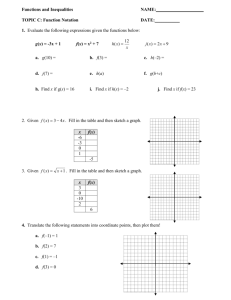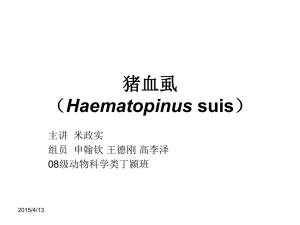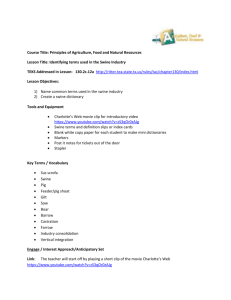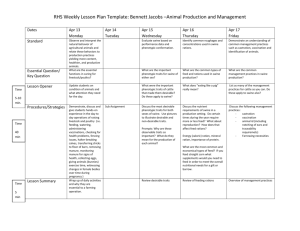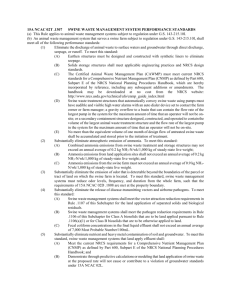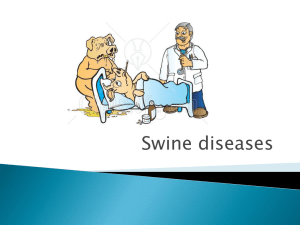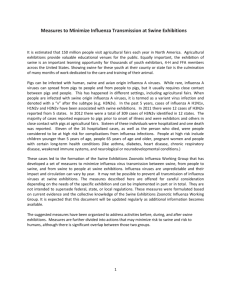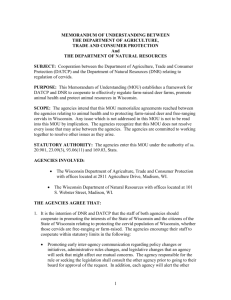Animal Health Exhibition Update for 2013
advertisement
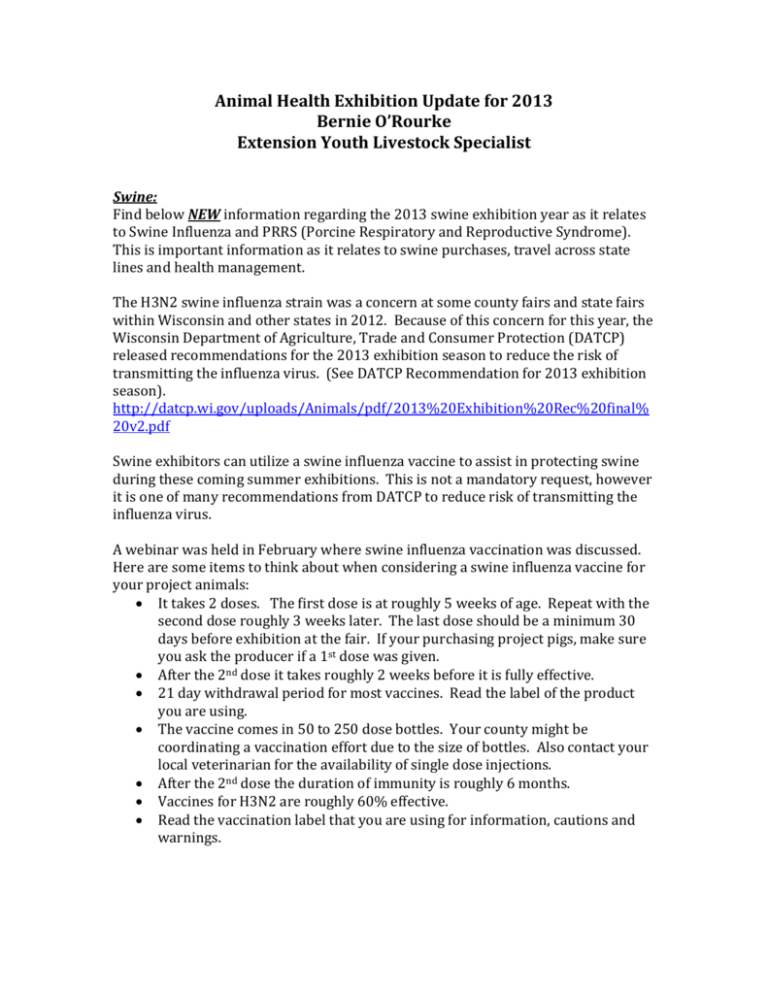
Animal Health Exhibition Update for 2013 Bernie O’Rourke Extension Youth Livestock Specialist Swine: Find below NEW information regarding the 2013 swine exhibition year as it relates to Swine Influenza and PRRS (Porcine Respiratory and Reproductive Syndrome). This is important information as it relates to swine purchases, travel across state lines and health management. The H3N2 swine influenza strain was a concern at some county fairs and state fairs within Wisconsin and other states in 2012. Because of this concern for this year, the Wisconsin Department of Agriculture, Trade and Consumer Protection (DATCP) released recommendations for the 2013 exhibition season to reduce the risk of transmitting the influenza virus. (See DATCP Recommendation for 2013 exhibition season). http://datcp.wi.gov/uploads/Animals/pdf/2013%20Exhibition%20Rec%20final% 20v2.pdf Swine exhibitors can utilize a swine influenza vaccine to assist in protecting swine during these coming summer exhibitions. This is not a mandatory request, however it is one of many recommendations from DATCP to reduce risk of transmitting the influenza virus. A webinar was held in February where swine influenza vaccination was discussed. Here are some items to think about when considering a swine influenza vaccine for your project animals: It takes 2 doses. The first dose is at roughly 5 weeks of age. Repeat with the second dose roughly 3 weeks later. The last dose should be a minimum 30 days before exhibition at the fair. If your purchasing project pigs, make sure you ask the producer if a 1st dose was given. After the 2nd dose it takes roughly 2 weeks before it is fully effective. 21 day withdrawal period for most vaccines. Read the label of the product you are using. The vaccine comes in 50 to 250 dose bottles. Your county might be coordinating a vaccination effort due to the size of bottles. Also contact your local veterinarian for the availability of single dose injections. After the 2nd dose the duration of immunity is roughly 6 months. Vaccines for H3N2 are roughly 60% effective. Read the vaccination label that you are using for information, cautions and warnings. NEW Importing swine into Wisconsin: and import permit disclosing the PRRS status of the herd (if known) is new starting March 1, 2013. If the status of the herd is unknown, write on the CVI and permit application “PRRS herd status unknown” If the status of the herd is known, the status can be identified by the categories listed here or by “PRRS Positive” or “PRRS Negative” PRRS is not a condition that prevents an import, so animals from a PRRSpositive herd or a herd of unknown status are eligible to enter Wisconsin For the rest of the swine rules go to: http://datcp.wi.gov/Animals/Animal_Movement/Swine/index.aspx Beef: All exhibition or event cattle (including steers) are required to have one form of official identification. ID requirements for cattle entering Wisconsin as of March 11, 2013: All sexually-intact animals of any age, including calves at side, must have one form of official identification. All dairy breed feeder cattle of any age, including steers born after March 11, 2013, must have one form of official identification (see section below). The certificate of veterinary inspection (CVI) must include the official individual ID for all intact animals. For steers, either the official individual ID or a statement on the CVI indicating the animals are officially identified is acceptable. All beef breed feeder cattle of any age, excluding steers, must have one form of official identification (the steer exemption does not apply to animals from TB Modified Accredited zones, Modified Accredited Advanced states or zones, or states Wisconsin treats as Modified Accredited Advanced because of current positive tuberculosis cases or investigations - see each state's specific requirements for details). All steers moving for rodeos, recreational events, shows, or exhibitions must have one form of official identification. The following are official ID: o USDA metal ear tag number that are part of the National Uniform Eartagging System (NUES) (starts with state 2-digit code, also known as “Brite” tag) o USDA "840" button tag number (includes the visual number and/or RFID) o 15-digit animal ID number with the first three digits/letters USA, 980, 982 or 985 (accepted as ID through March 11, 2015) o A backtag will work as ID for animals going directly to slaughter Effective March 11, 2013, the following forms of identification will no longer be valid for movement into the state of Wisconsin: breed association tattoo number breed association registration number Some of the provisions in the USDA’s traceability regulations do not apply in Wisconsin, such as brands as identification for interstate movement and age exemptions for certain classifications. For the rest of the rules regarding beef movement go to: http://datcp.wi.gov/Animals/Animal_Movement/Cattle_Bison/Import_Requiremen ts/index.aspx Sheep and Goats http://datcp.wi.gov/Animals/Animal_Movement/Sheep_Goats/index.aspx For the rest of the animal health rules for fairs & exhibitions go to: http://datcp.wi.gov/Animals/Animal_Movement/Fairs_Shows/index.aspx Special note: Animal health guidelines can change at anytime, therefore utilize the DATCP website for updates and changes. The Wisconsin Youth Livestock Program can be found by going to https://fyi.uwex.edu/youthlivestock. To receive email updates of information related to beef, sheep, swine and meat goats, on the right side of the page, add your email address and click subscribe. You can also connect with us on Twitter at https://twitter.com/wiyouthlvstk or on facebook, http://www.facebook.com/pages/Wisconsin-Youth-LivestockProgram/308375924101 Reviewed by Dr. Paul McGraw, DVM, Assistant Veterinarian DATCP and Dr. Warren Wilson, DVM, Swine Technical Services, Merck Animal Health. An EEO/AA employer, University of Wisconsin-Extension provides equal opportunities in employment and programming, including Title IX and ADA requirements.

